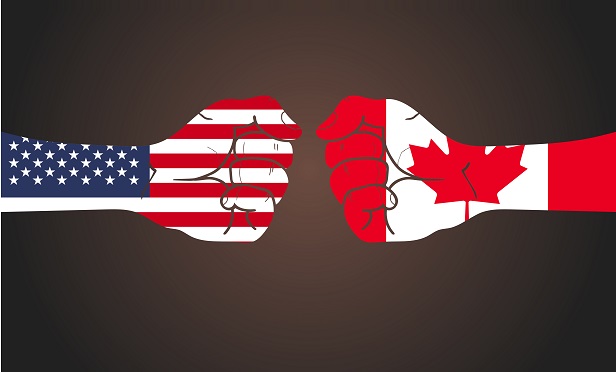 If you ask a Canadian if they like their single-payer health care system, you'll usually get a strong “Yes!” followed by a detailed description of how it's better than America's system. (Image: Shutterstock)
If you ask a Canadian if they like their single-payer health care system, you'll usually get a strong “Yes!” followed by a detailed description of how it's better than America's system. (Image: Shutterstock)
When was the last time you went to Canada? A trip north of the 49th parallel is a fantastic excursion. You'll likely find yourself thinking or saying at least a few of the following:
- These people are so friendly!
- Canada is like America's attic — there's some cool stuff up here.
- Other than this colorful money, the metric system and French on their signs, Canadians aren't that different from us.
- It's like Canada is the 51st state! (You might think this is a compliment, but Canadians hate this one.)
Similar, but different
It's easy to think Canadians are just Americans without (as many) handguns. But socially, they are significantly different. And if we're looking for Canadian lessons to apply to the American health care system, recognizing these differences really matters.
➤➤ Be sure to attend Reid Rasmussen's Education Track session, “American Health Care: 99 Problems & Single Payer Is One” April 3 at 2:45 p.m. at the 2019 BenefitsPRO Broker Expo.
Let's start with some basics about the population:
- Canada's land mass is larger than that of the U.S. (Seriously, check out a globe.)
- Canada has only 36 million people. That's about 9 percent of the U.S. population (comparable to the population of California).
- 90 percent of Canadians live within 100 miles of the U.S. border.
- Canadian culture is extremely influenced by American TV, magazines, companies, social media, etc.
Why does this matter? It means Canadians are much more educated about our American affairs than we are about theirs. And living in America's shadow breeds a touch of “little brother syndrome.” They're ready to compete with you, and you don't even realize they're in the running.Therefore, if you ask a Canadian if they like their single-payer health care system, you'll usually get a strong “Yes!” followed by a detailed description of how it's better than America's system. Boom, they won. And you didn't even know it was a competition.
Freedom vs. fairness
A more telling question to ask is: “What does it mean to be a Canadian?” You'll likely get some form of this answer: “Well, we're not like Americans. We care more about our people than you do. For example, our health care system.”
Think about that. Canadians define who they are by contrasting themselves with Americans, and they bring up health care to do it! Americans wouldn't do either. Even those of us who work in the health care system wouldn't think of “health care” when defining our national pride. Instead, I bet your answer would include the word “freedom.”
What insight does this give us? As strongly as Americans value freedom, Canadians value fairness. This is the critical social difference.
I see this playing out in three specific ways:
1. They're willing to pay more in taxes as long as the government “looks after me when the time comes.”
2. They're willing to wait their turn.
3. They trust in government, believing someone smarter is looking out for their best interests.
As a Canadian who has now lived in the USA for 28 years (and is now a citizen), I've yet to meet an American who matches these three statements!
Here's why: In all parts of America, and at all socio-economic levels, one foundational value reigns supreme: freedom of choice. Americans won't blindly do what we're told. We don't want to wait months for “our turn” to receive non-emergency health services. And we really don't believe someone is looking out for our interests in any way close to the way we'd look out for ourselves—especially not the government!
It's not that simple
So, although a Canadian will tell you they love their single-payer system, I don't believe that same system would fly in America. The next time a politician claims that single-payer is a simple solution, we need to dive into the details of their plan alongside the values of American people.
What lessons can we learn from the Canadian system? Why do the arguments for single-payer sound so convincing? What questions should we ask politicians who are convinced “Medicare for All” will make everyone happy? What should we, as an industry, be doing to educate ourselves and our clients?
We need to ask good questions: Exactly how will your planned “Medicare for All” system work like it does in Canada? Since no country in the world pays for all health care (there is unlimited demand and limited supply), how does your plan allocate resources? Are there better solutions to stabilize the industry, i.e. provide help for the uninsured versus the entire population?
As industry insiders, we need to keep learning and studying the issue and proposed solutions. We need to learn enough about other systems so we can guide the conversation more intelligently. We need to ensure our future health care system is built upon a foundation of values that work for Americans.
Don't miss these other Expo sessions:
© Touchpoint Markets, All Rights Reserved. Request academic re-use from www.copyright.com. All other uses, submit a request to [email protected]. For more inforrmation visit Asset & Logo Licensing.






